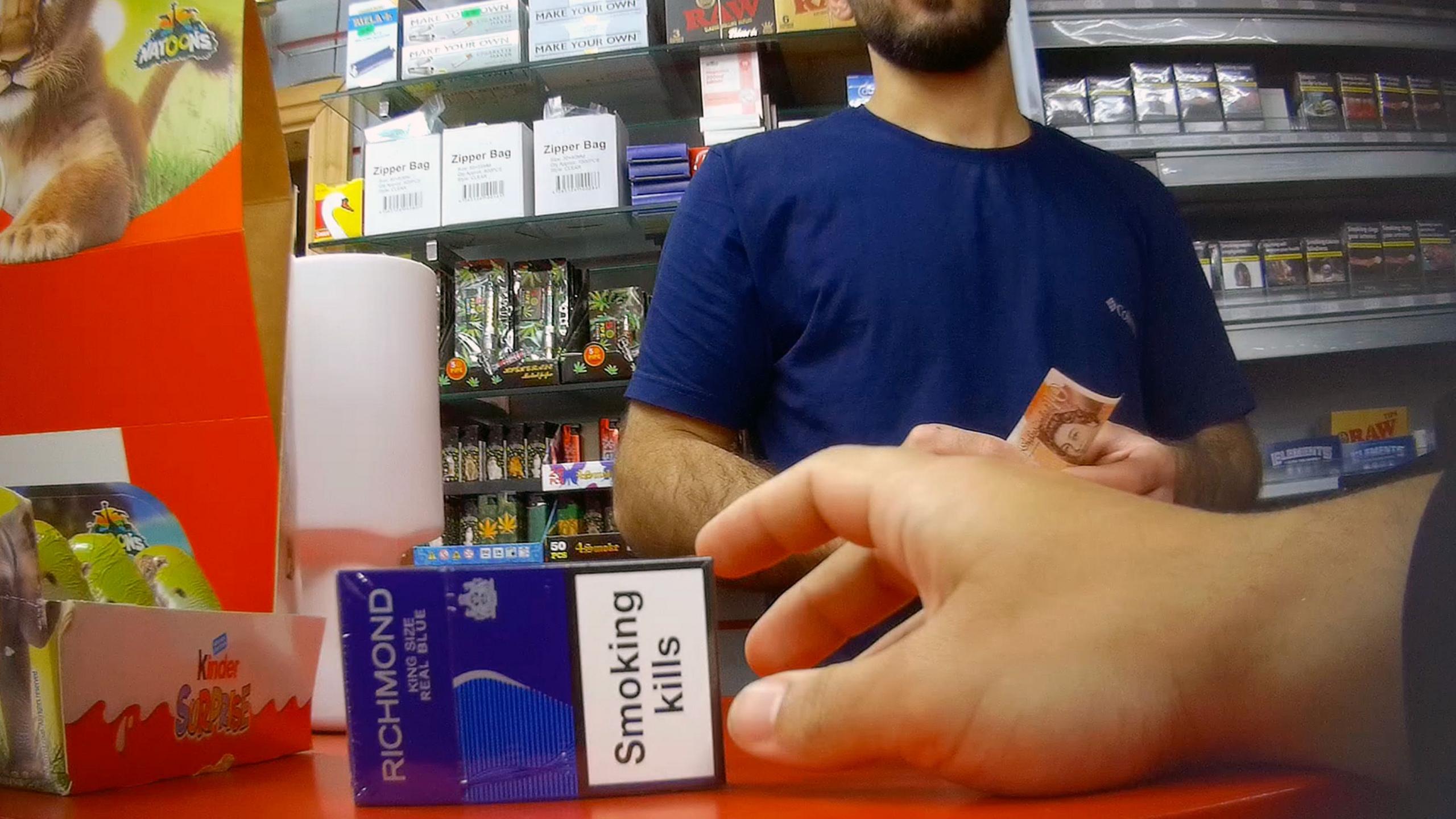Mini-mart crime network a 'pull factor' for illegal migrants, say MPs

Undercover filming by the BBC found illegal cigarettes and vapes for sale in the mini-marts
- Published
Senior politicians have warned that a UK-wide criminal network uncovered by the BBC is acting as a pull factor for illegal migration to the UK.
The Home Office has promised to investigate after a BBC investigation uncovered more than 100 businesses linked to a Kurdish gang enabling migrants to work illegally selling counterfeit cigarettes in High Street mini-marts.
Home Secretary Shabana Mahmood said these kinds of networks "create an incentive for people to come here illegally".
Responding to the investigation, Conservative shadow home secretary Chris Philp said "no wonder illegal immigrants want to cross the Channel", while Reform UK accused the government of "looking the other way".
The BBC uncovered a criminal network using "ghost directors" to represent companies' official paperwork while remaining uninvolved in day-to-day operations.
Undercover journalists posing as asylum seekers were told how easy it was to take over a shop and make thousands of pounds a week from illegal tobacco.
HMRC estimates the trade in illegal cigarettes and vapes costs the UK at least £2.2bn in lost revenue annually.
The investigation found asylum seekers working 14-hour shifts for as little as £4 an hour, often in legal limbo while waiting for Home Office decisions.
More than 100 mini-marts, barbershops and car washes, operating from Dundee to south Devon, were linked to the crime network by the BBC. But a financial crime investigator told the BBC he believes it goes much wider.
The BBC also discovered Kurdish builders offering to construct hidden compartments to conceal contraband during police raids, and Facebook groups advertising mini-marts for sale.
"This rampant illegal activity is happening right under the government's nose," Philp said.
"No wonder illegal immigrants want to cross the Channel and come to the UK when it is possible to do this here."
Only quitting the European Convention on Human Rights (ECHR) would unlock the increased powers to stop illegal "crossings and subsequent illegal working", Philp said.
Emergency asylum processing centres were needed to allow refugees to move into legal work "while those who don't have a right to stay must be returned", the Liberal Democrats said.
"The asylum system was broken by the Conservatives and Labour hasn't fixed it," Lib Dem home affairs spokesperson Max Wilkinson said.
"The fact that we have tens of thousands of asylum seekers waiting to be processed means there's an obvious group of potentially vulnerable people for organised crime gangs to exploit."
Reform UK's head of policy Zia Yusuf described the criminal network as "absolutely scandalous".
"Our high streets are being used for organised crime, and the government is looking the other way," he said.
"It's time these sham businesses were shut down and these criminals deported."
Why do Channel migrants want to come to the UK?
- Published9 July
Was Starmer right to link Brexit to a rise in small boat crossings?
- Published1 October
Business and Trade Secretary Peter Kyle branded the network uncovered by the BBC as "unacceptable" adding it "won't be allowed to happen on our watch".
"Under this government there's been an increase of 51% of raids on shops and businesses up and down the country," he said.
Through Operation Sterling, the government has invested £5m into immigration enforcement - acknowledging the loose regulation of Britain's labour market was acting as a pull factor for those entering the UK illegally.
Under the scheme more than 8,000 illegal migrants were arrested in the past year, with about 1,000 removed from the UK.
Last month, Mahmood said she wanted to "shrink the black economy" and dismantle the business model of smuggling gangs.
For obvious reasons, estimating the size of the black economy in the UK is complicated - but a recent study from researchers at the European Parliament suggests the size of the UK's was about 11% of the total economy in 2022. This is lower than the average of 17% across 31 European countries.
The Home Office say the government's roll out of digital ID will help combat illegal working by making it easier for employers to check the status of their employees.
Conservative shadow work and pensions secretary Helen Whately dismissed the digital ID plan as a "distraction and a red herring", saying the scheme would not have stopped the criminal network uncovered by the BBC.

Sign up for our Politics Essential newsletter to keep up with the inner workings of Westminster and beyond.